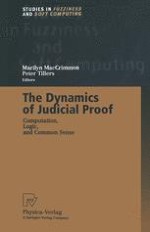2002 | OriginalPaper | Buchkapitel
Abductive Reasoning in Law: Taxonomy and Inference to the Best Explanation
verfasst von : Kola Abimbola
Erschienen in: The Dynamics of Judicial Proof
Verlag: Physica-Verlag HD
Enthalten in: Professional Book Archive
Aktivieren Sie unsere intelligente Suche, um passende Fachinhalte oder Patente zu finden.
Wählen Sie Textabschnitte aus um mit Künstlicher Intelligenz passenden Patente zu finden. powered by
Markieren Sie Textabschnitte, um KI-gestützt weitere passende Inhalte zu finden. powered by
Following the positivistic philosophy of Karl Popper and Hans Reichenbach,1 many traditionalist thinkers on rational proof in law still assume a sharp distinction between “the context of discovery” and “the context of justification.” These traditionalists regard the context of justification as the proper province of legal reasoning. Justification deals with the analysis and appraisal of decisions, judgments, arguments, and verdicts once they are already “on the table.” Thus, questions about the rational adequacy of a judge’s verdict, or about a police decision to charge a suspect, or about the viability of a case that the District Attorney chooses to prosecute are all important to traditional theories. However, questions about discovery2 play little or no role in many accounts of evidential reasoning in law. The traditionalist does not claim that discovery and imagination are unimportant. Rather, her claim is that a theory of legal reasoning should concern itself only with the logic of rational arguments. Imagination and discovery should be left to the psychologist. The legal theorist Neil MacCormick states this traditional stance very succinctly: “[I]n relation to legal reasoning, the process which is worth studying is the process of argumentation as a process of justification.”3
